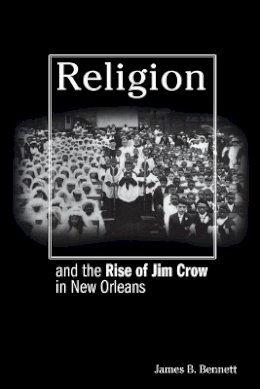
Stock image for illustration purposes only - book cover, edition or condition may vary.
Religion and the Rise of Jim Crow in New Orleans
James B. Bennett
€ 41.70
FREE Delivery in Ireland
Description for Religion and the Rise of Jim Crow in New Orleans
Paperback. Num Pages: 320 pages. BIC Classification: 1KBBSL; 3JH; HBJK; HBLL; HRCC2; JFSL1. Category: (P) Professional & Vocational; (U) Tertiary Education (US: College). Dimension: 235 x 155. .
Religion and the Rise of Jim Crow in New Orleans examines a difficult chapter in American religious history: the story of race prejudice in American Christianity. Focusing on the largest city in the late-nineteenth-century South, it explores the relationship between churches--black and white, Protestant and Catholic--and the emergence of the Jim Crow laws, statutes that created a racial caste system in the American South. The book fills a gap in the scholarship on religion and race in the crucial decades between the end of Reconstruction and the eve of the Civil Rights movement. Drawing on a range of local and personal accounts from the post-Reconstruction period, newspapers, and church records, Bennett's analysis challenges the assumption that churches fell into fixed patterns of segregation without a fight. In sacred no less than secular spheres, establishing Jim Crow constituted a long, slow, and complicated journey that extended well into the twentieth century. Churches remained a source of hope and a means of resistance against segregation, rather than a retreat from racial oppression. Especially in the decade after Reconstruction, churches offered the possibility of creating a common identity that privileged religious over racial status, a pattern that black church members hoped would transfer to a national American identity transcending racial differences. Religion thus becomes a lens to reconsider patterns for racial interaction throughout Southern society. By tracing the contours of that hopeful yet ultimately tragic journey, this book reveals the complex and mutually influential relationship between church and society in the American South, placing churches at the center of the nation's racial struggles.
Product Details
Format
Paperback
Publication date
2016
Publisher
Princeton University Press
Condition
New
Number of Pages
320
Place of Publication
New Jersey, United States
ISBN
9780691170848
SKU
V9780691170848
Shipping Time
Usually ships in 7 to 11 working days
Ref
99-1
About James B. Bennett
James B. Bennett is Assistant Professor of Religious Studies at Santa Clara University.
Reviews for Religion and the Rise of Jim Crow in New Orleans
"James Bennett has written a superb study of the tensions between religion and race among black Methodists and Catholics in New Orleans between 1880 and 1920... [He] provides important comparisons of Methodist and Roman Catholic leaders and church members who either resisted or supported racial separatism and the effects of this growing separatism on their identity."
Choice "Religion and the Rise of Jim Crow in New Orleans is a remarkable analysis of the complex and competing forces that shaped the south at the turn of the century. Bennett is certainly right in asserting that an examination of these moments of possibility, these opportunities for a social world that did not arise, intensify our awareness of the social order that did."
Justin D. Poche, American Catholic Studies "This is an enormously intelligent book about the confrontations and negotiations within Methodist and Catholic churches over issues of race, focusing on the period between 1877 and 1920... This book sets a high standard for analysis of the nineteenth-century evolution of religion and race, and scholars of American religion and history will find it an indispensable resource."
Stephen W. Angell, Journal of Southern History
Choice "Religion and the Rise of Jim Crow in New Orleans is a remarkable analysis of the complex and competing forces that shaped the south at the turn of the century. Bennett is certainly right in asserting that an examination of these moments of possibility, these opportunities for a social world that did not arise, intensify our awareness of the social order that did."
Justin D. Poche, American Catholic Studies "This is an enormously intelligent book about the confrontations and negotiations within Methodist and Catholic churches over issues of race, focusing on the period between 1877 and 1920... This book sets a high standard for analysis of the nineteenth-century evolution of religion and race, and scholars of American religion and history will find it an indispensable resource."
Stephen W. Angell, Journal of Southern History
